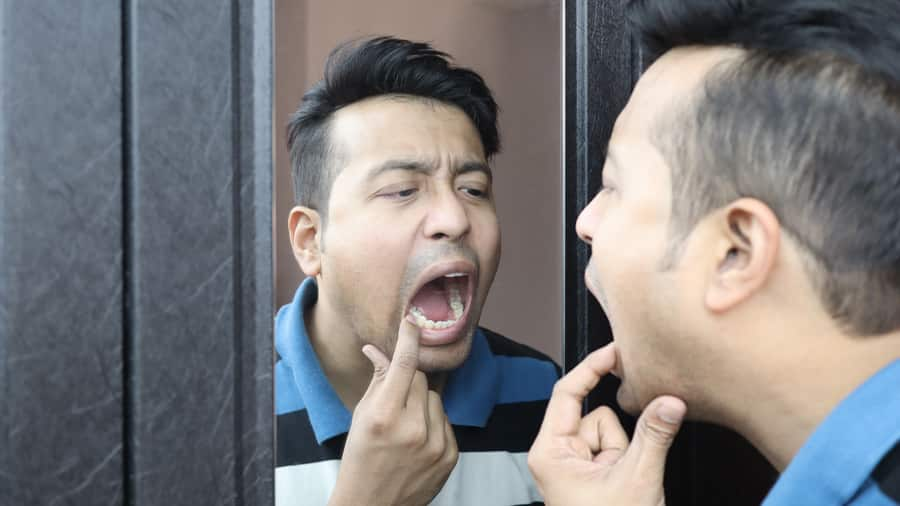How to Get Rid of Teeth Sensitivity After Whitening
Teeth sensitivity is a common side effect of whitening your teeth. There are many ways to treat sensitive teeth after whitening, and we are going to discuss them in detail.
Sensitivity after teeth whitening is a temporary side effect. However, there are many ways to get rid of sensitive teeth caused by teeth whitening so that you can enjoy your bright smile with confidence.
What causes tooth sensitivity after a whitening treatment?
There are three main reasons sensitive teeth can occur after a whitening treatment.
First, the bleach in your treatment may have been too concentrated for your particular mouth chemistry to handle.
Second, if you used a tray-style at-home whitening kit instead of an over-the-counter type of product, this could also be responsible for tooth sensitivity.
Finally, your sensitive teeth after whitening could be caused by the high levels of peroxide in some bleaching agents.
What is the reason behind sensitivity after teeth whitening treatment?
The reason for this discomfort is that the bleaching agent, whether it be hydrogen peroxide or carbamide peroxide, causes a chemical reaction on the tooth surface. This, in turn, increases the porosity of the enamel and makes it more sensitive to hot and cold foods and drinks.
How to get rid of teeth sensitivity after whitening?
Whatever the reason for sensitive teeth after whitening may be, there are several steps that you can take to get rid of it and protect yourself from further irritation. However, if you experience any pain or discomfort that lasts for more than a few days, be sure to consult your dentist.
Be gentle on your teeth
When you get back from your whitening appointment, it is important to be gentle when brushing. Use a soft-bristled toothbrush and lukewarm water so as not to irritate sensitive gums or cause damage that could lead to more serious complications like dental caries infection. Use fluoride toothpaste for sensitive teeth twice a day after brushing to help promote re-mineralization.
Use a soft-bristled toothbrush
It is best to be gentle when brushing after your teeth whitening treatment. Use a soft-bristled toothbrush and lukewarm water. Colgate Sensitive Ultrasoft Toothbrush will be an excellent option.
Avoid exposure to hot and cold drinks or food
To keep your teeth sensitivity in check after a whitening treatment, it is best to avoid exposing them to anything too hot or cold. This means no more ice-cold beverages and steaming soups for a few days after the treatment. If you cannot resist, drink them through a straw so that they bypass your sensitive teeth altogether.
Apply a sensitive teeth toothpaste
There are many toothpastes for sensitivity on the market that work by blocking the tubules in the dentin layer of your teeth, which is where most of the pain comes from. You should look for a toothpaste with potassium nitrate and/or arginine s, as these ingredients have been shown to be effective in sensitive teeth. For example using Colgate Sensitive , Colgate Sensitive Clove, and Colgate Sensitive Plus may provide relief depending on the level of severity of your teeth sensitivity.
Moreover, Colgate Visible White O2 is designed to whiten teeth gently without causing tooth sensitivity.
Mouthwash
Use a mouthwash for sensitive teeth containing fluoride or potassium nitrate twice daily before bedtime. It will help to soothe the sensitive areas and provide relief from pain. Go for Colgate Plax Gentle Care Mouthwash that has all the right ingredients to avoid further irritation.
Choose an Alternative Teeth Whitening Treatment:
Your tooth sensitivity could also be due to the process of teeth whitening. So consult your dentist and try changing the treatment plan, whitening agent or the concentration of whitening gel you are using. This can help to prevent tooth sensitivity and still give you the bright smile that you desire.
Limit the frequency of whitening procedures caused
If your sensitive teeth after whitening are by bleach, then limiting your number of treatments will help. This means that if you have sensitive teeth after the first treatment and want to do another session, it is best to wait until those symptoms disappear first. If they do not go away entirely or return right after doing a second session, it is best to try a different type of whitening solution. The same applies to treatments for teeth whitening for sensitive teeth.
Consult a dentist if the sensitivity persists
Sensitive teeth are a relatively common side effect of whitening treatments. It is important to speak with your dentist about how you can manage this, so it does not continue to affect your oral health and disrupt your daily life.
Some people have success using toothpaste that is specifically for sensitive teeth, while others find relief from sensitivity by brushing their teeth before bedtime or rinsing them after eating acidic foods. If these tips do not work on your sensitive teeth after whitening, talk with your dentist, who may recommend other alternatives such as taking an over-the-counter pain reliever.
This article is intended to promote understanding of and knowledge about general oral health topics. It is not intended to be a substitute for professional advice, diagnosis or treatment. Always seek the advice of your dentist or other qualified healthcare provider with any questions you may have regarding a medical condition or treatment.
ORAL HEALTH QUIZ
What's behind your smile?
Take our Oral Health assessment to get the most from your oral care routine
ORAL HEALTH QUIZ
What's behind your smile?
Take our Oral Health assessment to get the most from your oral care routine












